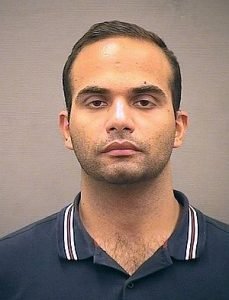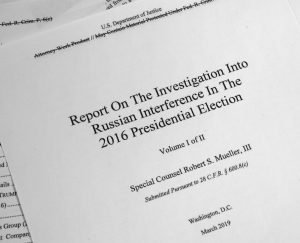Sharing the Mueller Report bit by bit
ZHENGZHOU, HENAN --This has never been a political blog, mostly because there were so many already that adding another seemed pointless when I began this publication more than 13 years ago.
It's time to make an exception to my rule of avoiding political analysis, because the investigation and report by Special Counselor Robert Mueller and his team transcends politics -- though the people whose names are mentioned in the report (looking at you, Donald Trump!) may disagree.
Without a doubt, the Russian government meddled in the US elections in 2016. Without a doubt, the Russian government had a clear preference for anyone but Hillary Clinton as president, and so orchestrated (and may still be orchestrating) multi-pronged attacks on our electoral process.
It is also fairly clear that the Trump campaign, including its operatives and associates, willingly accepted the assistance of the Russian efforts, rather than reporting to the FBI the Russians' repeated attempts to provide information beneficial to the Trump campaign. Moreover, there were clear attempts by some members of the Trump organization to provide helpful information to the Russians. It's all in the report, and it's also worth noting that several of those Trump associates are now either in jail, have been in jail, or are facing trial.
Without going so far as to directly accuse Donald Trump of obstruction of justice, the report nevertheless details many attempts by the president to limit, stop or otherwise interfere with the Mueller probe. This second part of the report is as alarming as the first. It suggests that Trump, despite his repeated claims of innocence, would prefer some details of his 2016 campaign be forever hidden from view. One should ask, why?
My plan here is to share the Mueller report, a redacted copy of which is freely available for download, in small bite-size pieces, so that more people may read it directly. It is 448 pages long, including notes and appendices, and it is not exactly written as a political thriller. It's dry and business-like, and it exhaustively documents how the Russians and the Trump campaign had many contacts during the campaign, and how President Trump has tried to prevent such details from being discovered and published. Seeing it online in smaller chunks may encourage people to read it, eventually, in its entirety.
I will add commentary occasionally in an effort to clarify matters.
The report leads with a table of contents, but I am omitting that to begin with the introduction to volume 1.
This report is submitted to the Attorney General pursuant to 28 C.F.R. §600.8(c), which states that , "[a]t the conclusion of the Special Counsel's work, he ... shall provide the Attorney General a confidential report explaining the prosecution or declination decisions [the Special
Counsel] reached."
The Russian government interfered in the 2016 presidential election in sweeping and systematic fashion. Evidence of Russian government operations began to surface in mid-2016. In June, the Democratic National Committee and its cyber response team publicly announced that Russian hackers had compromised its computer network. Releases of hacked materials -- hacks that public reporting soon attributed to the Russian government -- began that same month.
Additional releases followed in July through the organization WikiLeaks, with further releases in October and November.

FBI booking shot
of George Papadopoulos
In late July 2016, soon after WikiLeaks's first release of stolen documents, a foreign government contacted the FBI1 about a May 2016 encounter with Trump Campaign foreign policy advisor George Papadopoulos2. Papadopoulos had suggested to a representative of that foreign government that the Trump Campaign had received indications from the Russian government that it could assist the Campaign through the anonymous release of information damaging to Democratic presidential candidate Hillary Clinton. That information prompted the FBI on July 31, 2016, to open an investigation into whether individuals associated with the Trump Campaign were coordinating with the Russian government in its interference activities.
That fall, two federal agencies jointly announced that the Russian government "directed recent compromises of e-mails from US persons and institutions, including US political organizations," and , " [t]hese thefts and disclosures are intended to interfere with the US election process." After the election, in late December 2016, the United States imposed sanctions on Russia for having interfered in the election. By early 2017, several congressional committees were examining Russia's interference in the election.
Within the Executive Branch, these investigatory efforts ultimately led to the May 2017 appointment of Special Counsel Robert S. Mueller, III. The order appointing the Special Counsel authorized him to investigate "the Russian government's efforts to interfere in the 2016 presidential election," including any links or coordination between the Russian government and individuals associated with the Trump Campaign.
As set forth in detail in this report, the Special Counsel's investigation established that Russia interfere~ in the 2016 presidential election principally through two operations. First, a Russian entity carried out a social media campaign that favored presidential candidate Donald J. Trump and disparaged presidential candidate Hillary Clinton. Second, a Russian intelligence service conducted computer-intrusion operations against entities, employees, and volunteers working on the Clinton Campaign and then released stolen documents. The investigation also identified numerous links between the Russian government and the Trump Campaign. Although the investigation established that the Russian government perceived it would benefit from a Trump presidency and worked to secure that outcome, and that the Campaign expected it would benefit electorally from information stolen and released through Russian efforts, the investigation did not establish that members of the Trump Campaign conspired or coordinated with the Russian government in its election interference activities.
[EDITOR: It's worth noting here that the words "did not establish" only mean the investigators could not obtain conclusive evidence of conspiracy or coordination, not that such conspiracy or coordination did not occur. In other words, a broken, empty cookie jar and cookie crumbs all over the floor are not conclusive evidence that your child raided the cookie jar when you weren't around, but they are evidence that something probably happened.]
Below we describe the evidentiary considerations underpinning statements about the results of our investigation and the Special Counsel's charging decisions, and we then provide an overview of the two volumes of our report. The report describes actions and events that the Special Counsel's Office found to be supported by the evidence collected in our investigation. In some instances, the report points out the absence of evidence or conflicts in the evidence about a particular fact or event. In other instances, when substantial, credible evidence enabled the Office to reach a conclusion with confidence, the report states that the investigation established that certain actions or events occurred. A statement that the investigation did not establish particular facts does not mean there was no evidence of those facts. [EDITOR: As in the cookie jar scenario above]
In evaluating whether evidence about collective action of multiple individuals constituted a crime, we applied the framework of conspiracy law, not the concept of "collusion." In so doing, the Office recognized that the word "collude" was used in communications with the Acting Attorney General confirming certain aspects of the investigation's scope and that the term has frequently been invoked in public reporting about the investigation. But collusion is not a specific offense or theory of liability found in the United States Code, nor is it a term of art in federal criminal law. For those reasons, the Office's focus in analyzing questions of joint criminal liability was on conspiracy as defined in federal law. In connection with that analysis, we addressed the factual question whether members of the Trump Campaign "coordinated" -- a term that appears in the appointment order -- with Russian election interference activities. Like collusion, "coordination" does not have a settled definition in federal criminal law. We understood coordination to require an agreement -- tacit or express -- between the Trump Campaign and the Russian government on election interference. That requires more than the two parties taking actions that were informed by or responsive to the other's actions or interests. We applied the term coordination in that sense when stating in the report that the investigation did not establish that the Trump Campaign coordinated with the Russian government in its election interference activities.
[EDITOR: Here the Mueller team is being quite lawyerly in explaining the differences among collusion, conspiracy and coordination. Non-lawyers would say they are splitting hairs. To some extent, the report does in fact say "no collusion," as Donald Trump is wont to repeat over and over again, but only in the sense it does not use those exact words. Reading between the lines of the report would lead anyone with an open mind to deduce that something fishy was going on, much as a wise parent would probably deduce that little Johnny or Susie had eaten the cookies missing from the broken cookie jar.]
The report on our investigation consists of two volumes:
Volume I describes the factual results of the Special Counsel's investigation of Russia's interference in the 2016 presidential election and its interactions with the Trump Campaign.
Section I describes the scope of the investigation. Sections II and III describe the principal ways Russia interfered in the 2016 presidential election . Section IV describes links between the Russian government and individuals associated with the Trump Campaign. Section V sets forth the Special Counsel's charging decisions.
Volume II addresses the President 's actions towards the FBI's investigation into Russia's interference in the 2016 presidential election and related matters, and his actions towards the Special Counsel 's investigation. Volume II separately states its framework and the considerations that guided that investigation.
Footnotes:
- That foreign government was Australia. George Papadopoulos had mentioned in a 2016 private conversation with Alexander Downer, Australia's High Commissioner to the United Kingdom, that Russians had told Papadopoulos they had "dirt" on candidate Hillary Clinton. The New York Times reported on the conversation in December. Downer recently told Buzzfeed.com that the Australian government was now willing to provide details about the meeting with Papadopoulos.
- Papadopoulos plead guilty last year to lying to the FBI about meetings with Russian operatives, and was sentenced in September to 14 days in a federal prison. He served that term in November. BBC report

Congratulations @wheatdogg! You have completed the following achievement on the Steem blockchain and have been rewarded with new badge(s) :
You can view your badges on your Steem Board and compare to others on the Steem Ranking
If you no longer want to receive notifications, reply to this comment with the word
STOPVote for @Steemitboard as a witness to get one more award and increased upvotes!